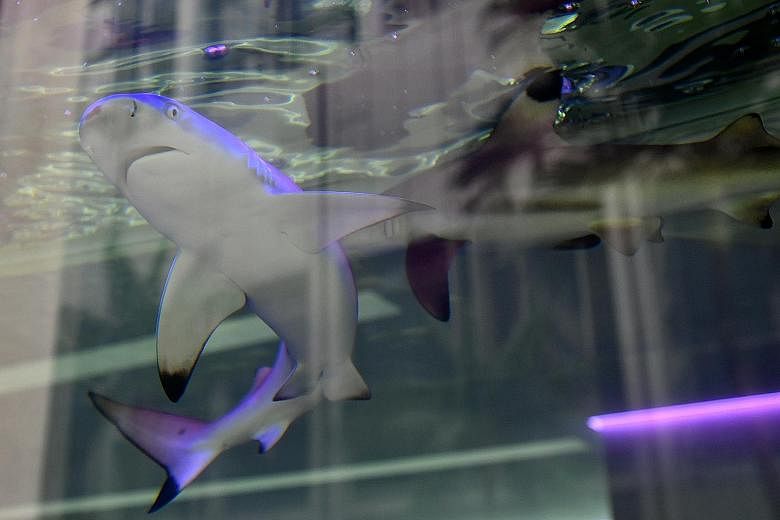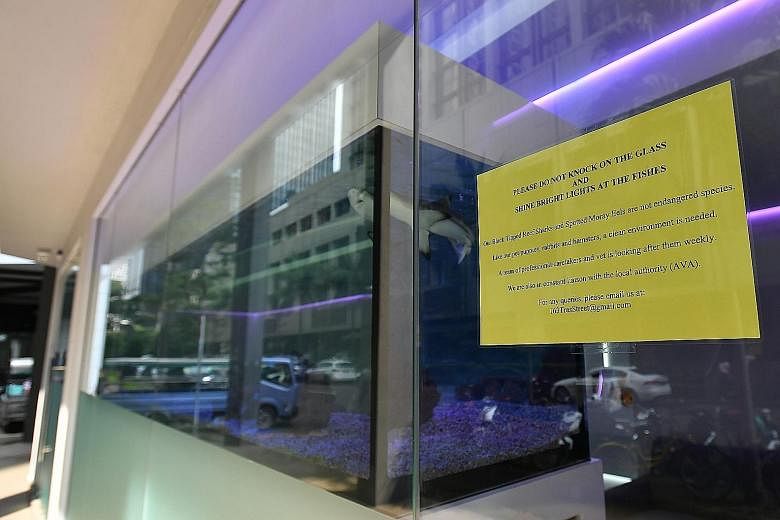Marine conservationists have raised concern over three juvenile blacktip reef sharks spotted in the aquarium of a dental clinic in Tanjong Pagar, calling for the animals to be moved to a bigger facility.
The argument has turned ugly in the community on social media, with netizens taking sides and some resorting to name calling.
It is not illegal to keep sharks in a tank. But the issue is whether such large-ranging animals should be kept in private tanks in the first place, said marine conservationist and photographer Michael Aw, 61.
Blacktip reef sharks, which can be found in Singapore's waters, typically grow to about 1.6m, and up to 2.9m, said Mr Aw.
The sharks seen at the Braces & Implant Dental Centre at 163 Tras Street now measure about an arm's length, or about 0.3m.
"The tank is far too small to allow for the natural growth and behaviour of this species," said Mr Aw. "Black tips are (related to) the bull shark and oceanic whitetip shark - they are big animals and free ranging."
In response to queries, a spokesman for the Agri-Food and Veterinary Authority (AVA) said its officers had visited the dental clinic and did not find any animal welfare issues. "The clinic had also engaged an aquarist to maintain the tank and take care of the fish. The sharks were also seen by an aquatic veterinarian," said AVA.
The sharks were spotted in the tank in the last week of December by one of Mr Aw's colleagues, Ms Linda Leong, who took a video of the animals and uploaded it on Facebook.
It prompted netizens and marine conservationists to express concern for the welfare of the animals.
Mr Aw has sent e-mails since Jan 2 to the clinic, asking for the release of the sharks. Dr Jimmy Gian, the owner of the dental clinic, replied on Jan 6, sparking an e-mail exchange which grew increasingly heated.
Over the phone last night, Dr Gian told The Straits Times he had purchased the sharks with the intention of releasing them when they grew beyond 0.6m, as the tank could not accommodate the adult sharks anyway.
He added that he had been working with a veterinarian on a plan to release the sharks when they got bigger, and that they were scouting for possible release locations. His delay in responding was because details in the plan were still being worked out, Dr Gian said.
But the escalation of the issue on social media had resulted in the clinic staff bearing the brunt of online abuse, which made it hard to engage in discussions with the conservationists, said Dr Gian.
Mr Aw had provided updates on the issue on his Facebook page, which were shared by other individuals and groups unaffiliated to him. Some had resorted to name-calling.
Dr Gian said the objective of the aquarium was to show the public "the beautiful side of sharks", and to change the perception that sharks are fearsome.
Mr Stephen Beng, chairman of the marine conservation group of the Nature Society (Singapore), said sharks do not fare well in captivity, but called for calm over the issue.
He said: "We shouldn't victimise the owner but continue to share our knowledge with people that wild animals must not be kept as pets. We must also exert our influence to stop the supply and trade of these animals."



